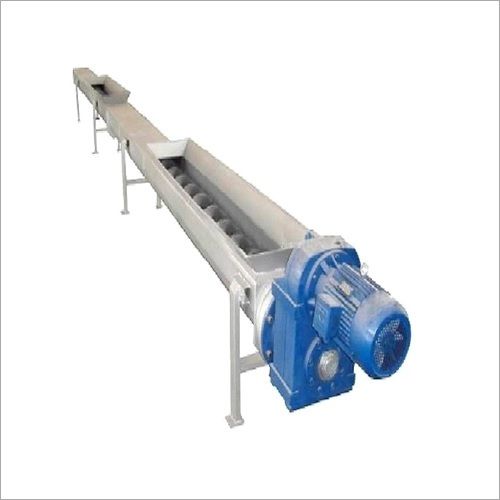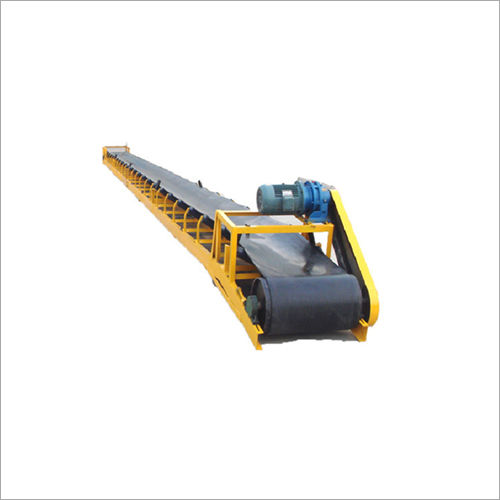

Screw Conveyor
80000.00 INR/Unit
Product Details:
- Material Cast Iron, Steel
- Product Type Screw Conveyor
- Drive Type Electric
- Power Source Electricity
- Automatic Grade Semi Automatic
- Click to view more
X
Screw Conveyor Price And Quantity
- 80000.00 INR/Unit
- 1 Unit
Screw Conveyor Product Specifications
- Electric
- Cast Iron, Steel
- Electricity
- Semi Automatic
- Screw Conveyor
Screw Conveyor Trade Information
- 2 Unit Per Week
- 6 Week
- All India
Product Description
The demand of Screw Conveyor is consistently there on the lookout, which is the reason we are here to satisfy this interest with our patent level creation. This item is made ideal way by using superb quality required materials with the help of innovative technology. It is widely utilized for conveying bulk material from one place to another. All the provided items are tested on the various quality parameters before dispatching them from our premises. We deliver this product at cost-effective price rate.
Screw Conveyor Specifications:
1. Screw Size: 250mm - 600mm wide
2. Length: 2000mm to 6000mm
3. Height: Min 400mm
4. Frame Material: SS 304 / SS 316
5. Screw material: Wear resistant steel / SS 304 / SS 316
6. Lining Material: UHMWPE / HDPE / Hardox 400
Screw Conveyor Applications:
1. Agriculture: Screw conveyors are used in agricultural operations for conveying grains, seeds, fertilizers, and other agricultural products.
2. Food Processing: In the food industry, screw conveyors are employed for handling bulk materials such as grains, flour, sugar, spices, and other food products. They are often used in processing, packaging, and transportation systems.
3. Mining and Minerals: Screw conveyors are utilized in mining operations for conveying ores, minerals, and other materials from one location to another. They are particularly useful in transporting bulk materials in underground mining operations.
4. Wastewater Treatment: Screw conveyors play a crucial role in wastewater treatment plants for conveying sludge, biosolids, and other waste materials. They are commonly used in dewatering systems and sludge handling processes.
5. Chemical Industry: Screw conveyors are integral to chemical processing plants for conveying various chemicals, powders, granules, and other materials used in manufacturing processes.
6. Construction and Cement: In construction and cement industries, screw conveyors are employed for transporting cement, aggregates, sand, and other construction materials at batching plants, concrete mixing plants, and construction sites.
7. Power Plants: Screw conveyors are used in power plants for handling biomass, coal, ash, and other materials used in power generation processes. They play a role in conveying fuel to boilers and transporting ash for disposal.
8. Recycling: Screw conveyors are utilized in recycling facilities for handling recyclable materials such as plastics, paper, glass, and metal scraps. They help in transporting materials between different stages of the recycling process.
9. Pulp and Paper Industry: Screw conveyors are essential in the pulp and paper industry for transporting wood chips, pulp, paper products, and other materials involved in the manufacturing process.
10. Pharmaceuticals: In pharmaceutical manufacturing, screw conveyors are used for handling powders, tablets, capsules, and other pharmaceutical ingredients. They ensure efficient and hygienic material handling in compliance with industry standards.
11. Packaging: Screw conveyors are employed in packaging facilities for conveying bulk materials such as powders, granules, and pellets to packaging machines for filling containers and bags.
12. Ceramics and Glass: Screw conveyors are used in ceramics and glass manufacturing for transporting raw materials, powders, and finished products within the production facility.
Screw Conveyor FAQ:
Q. What are the main components of a screw conveyor?
Ans: The main components of a screw conveyor include the screw (helical blade), trough or tube, drive unit (motor, gearbox), bearings, and support structure. Optional components may include covers, inlet and discharge chutes, and sensors for monitoring.
Q. What types of materials can be conveyed with screw conveyors?
Ans: Screw conveyors can handle a wide range of materials, including grains, seeds, powders, pellets, granules, minerals, chemicals, sludge, biomass, and many others. The suitability of a screw conveyor for a specific material depends on factors such as particle size, density, and flow characteristics.
Q. What are the advantages of using screw conveyors?
Ans: Some advantages of screw conveyors include their versatility, ability to handle various materials, compact design, simplicity of operation, low maintenance requirements, and cost-effectiveness for transporting bulk materials over short to moderate distances.
Q. How do I determine the capacity of a screw conveyor?
Ans: The capacity of a screw conveyor depends on factors such as the screw diameter, pitch, speed, material density, and fill level. Manufacturers often provide capacity charts or calculation formulas to help determine the required conveyor size and capacity based on specific application requirements.
Q. What safety precautions should be taken when operating screw conveyors?
Ans: Safety precautions for screw conveyors include proper guarding to prevent contact with moving parts, regular maintenance of mechanical components, ensuring proper electrical safety measures, providing emergency stop controls, and training operators on safe operation and maintenance procedures.
Q. Can screw conveyors be inclined or vertical?
Ans: Yes, screw conveyors can be configured to operate at various angles, including horizontal, inclined, or vertical orientations. Inclined screw conveyors are commonly used for lifting materials to different levels, while vertical screw conveyors are suitable for applications where space is limited.
Q. How do I select the right screw conveyor for my application?
Ans: When selecting a screw conveyor, consider factors such as material type, particle size, flow rate, conveying distance, operating environment (temperature, humidity), required capacity, and space constraints. Consulting with a knowledgeable engineer or conveyor manufacturer can help ensure the right conveyor is chosen for your specific needs.
Q. What maintenance is required for screw conveyors?
Ans: Maintenance tasks for screw conveyors may include regular inspection of bearings, seals, and drive components, lubrication of moving parts, cleaning of the trough or tube, checking for wear or damage to the screw blade, and addressing any issues promptly to prevent downtime or equipment failure.
Q. Can screw conveyors be customized for specific applications?
Ans: Yes, screw conveyors can be customized to meet specific application requirements, such as special materials of construction (e.g., stainless steel for food-grade applications), special coatings or liners for abrasive materials, variable speed drives for adjustable throughput, and other features tailored to the unique needs of the application.
Disclaimer: Prices are subject to change based on individual client requirements. The final cost of services/products may vary depending on the specific needs and preferences of each client. Please contact us for a personalized quote tailored to your unique specifications.
Enter Buying Requirement Details
 English
English Spanish
Spanish French
French German
German Italian
Italian Chinese (Simplified)
Chinese (Simplified) Japanese
Japanese Korean
Korean Arabic
Arabic Portuguese
Portuguese

